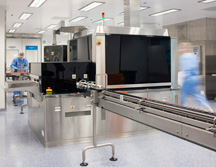 |
| U.S. Merck plant--Courtesy of Merck |
Over the past decade patent expiries have forced many Big Pharma to close production plants that supported decades of growth. With the current and next generations of small molecules and biologics raising the bar for manufacturing complexity, Eli Lilly ($LLY), Merck ($MRK) and their peers face a choice: build plants or outsource?
Outsourcing-Pharma spoke to Lilly and Merck about how they approach the question and got two quite different answers. While Lilly has shown a willingness to outsource R&D and buy in active pharmaceutical ingredients (API) and intermediates, it has also invested in in-house capacity for its finished products. The strategy led Lilly to invest €330 million in its Kinsale, Ireland campus, an outlay it views as being justified when the technical challenges and risks of outsourcing are considered.
"Lilly has a strategy of maintaining in-house control over more complex processes," Chris Langan, general manager at Kinsale, told Outsourcing-Pharma, adding that the work "requires a degree of specialization and capability that we have worked hard to build over the past several years." Trusting a third party with the production of a relatively simple intermediate--which could possibly be sourced from multiple suppliers to mitigate risk--is easier than handing over responsibility for a complex blockbuster.
Other Big Pharma have made similar decisions, with Merck KGaA and Roche ($RHHBY) among the companies to invest in in-house capacity this year. The strategy still involves risks though, with investments sometimes made in anticipation of demand for drugs not yet approved. For Merck VP Brendan O'Callaghan, the five-year timeline and financial outlay needed to get a new plant operational presents enough of a risk for the company to hold fire on adding capacity.
"We're choosing carefully in terms of when we would make that investment. In the meantime [we're] leveraging over-capacity available externally within biopharma," O'Callaghan said. The reference to over-capacity suggests supply still is outstripping demand, a fact that should result in favorable terms for companies outsourcing production. Merck signed up to outsource some biologics production to KBI Biopharma earlier this month in a deal that also saw it offload a plant it bought in 2009 for $130 million.
- read Outsourcing-Pharma article